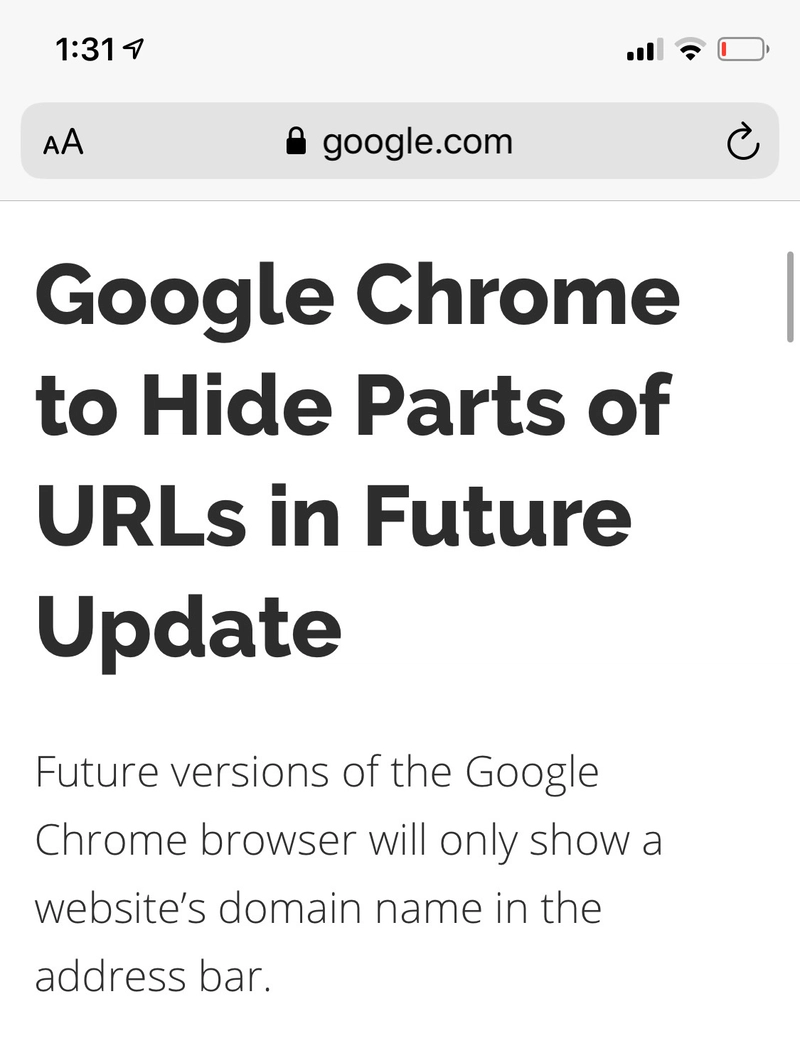It appears that Chrome is taking more steps towards obfuscation of URLs.
👉 Google Chrome to Hide Parts of URLs in Future Update
But what's the big deal? It's not like the typical user gets anything from the URL...
Part of this issue is that URLs are a component of technical literacy we all wish we didn't just throw the towel in on. But I think the bigger issue really isn't about the URL itself at all. People in the developer ecosystem are concerned about Google eating the web, and anything they do to change things is going to be scrutinized in this lens.
Here is a screenshot of AMP (Accelerated Mobile Pages)
Pardon my low battery, but google.com did not write this article. This is AMP—one of Google's boldest moves in consuming the web. Since this is a dev site, we don't need to get into that whole thing too specifically.
Google's moves to erode standards, monopolize certain technologies and services, and build the web in a self-serving way is always going to rub people the wrong way.
This issue cannot be seen as whether this individual outcome is problematic, but whether we want to allow the open web to die by a thousand paper cuts.
Google has helped push the world wide web forward, and that cannot be ignored or taken for granted, but in its position of dominance it has taken steps to capture value rather than strictly emit it.
You could say that Apple is choking the web from a different direction and that Microsoft has just handed power to Google because it's the better short term play. However, it is Google that most needs to be under the microscope when it makes any bold choices about the future of the web and the browser.
Any URL debate is about much more than just the URL.




Latest comments (25)
I would stop using Chrome if they ever make this URL hiding mandatory in their browser.
With this "feature" Chrome is unusable for web development or web admin. May as well not have a location bar at all. Will only run it if forced to by crappy non-standard web sites which only test in Chrome. Maybe boycott those sites.
Phishing is my biggest concern. We preach constantly to our users to verify that the URL is where you really think you should be going and if the browser starts doing funny things with the URL it might make that a bit more difficult for the user to verify it. Experience shows that if you make something more difficult for a user they will just blow it off instead of spending the extra time to verify they are where they should be.
What I love is when I go to share a link from a Google tile and, instead of getting the bare URL, I get a AMPified URL that's three pages long. If I want to share a direct link, I have to go out of my way to do it.
You want to say, "look, you twits: if you're going to insist on altering URLs, how about you make them more compact instead of decidedly less?"
Of course, I'm still salty as hell as to what happened to all of my Photos tags after Google decided that their face-recognition algorithms were a more-reliable tagging-source than the tags that the photos were uploaded with.
The only problem I have is that the "Big Tech" is where the innovation happens in tech, they are the only few orgz who can create/destroy stuff which i sometimes don't like.
Do we have a say in this ?
I mean I am not saying whether its a good move or not but in this way things in future will be like what Black Mirror portrays us :(
I'm glad I switched to brave.
I never understood AMP, if you care about performace your site will be fast, you willnot need AMP.
When minimalism goes too far.
I think it makes sense to hide it for non-technical users. What really matters is that its clear that this site is from where it says its from and helps with phishing scams. Just yesterday I got a sketchy link asking for my bank creds from bank-of-america.com.fjsi4rj.ru
URLs is something that any internet user needs to understand, just like folder path is something any computer user needs to understand. Any attempt to hide it will lead to restricting user's freedom. Users should be able to interact with a URL like with any other text input in the page, they should see the text, understand it, copy, paste, modify. If the URLs are not shown, not only users actions are going to be restricted, but it could lead to reduced literacy on how the internet works. Think of an old lady not understanding what a URL is, and imagine that this lack of understanding is going to be a norm - what good does it do?
I already get annoyed having to triple-click the URL to get back https and www to copy. This is lame. I assume that the article's reference to hover for full URL would also be valid for clicking, but I wouldn't put it too past Google to hide it harder.
Triple click and - if you want to copy a part of it - seeing the url jumping to the right when the 'https' part magically appears after one of the clicks, sending your selection away from the pointer. Infuriating